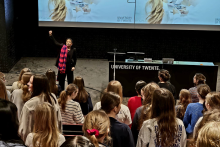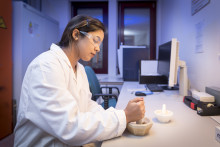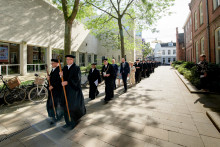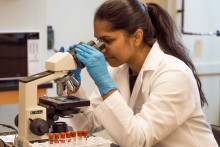The lunch event was organized by the Female Faculty Network Twente (FFNT). Its focal point was the TU/e Irène Curie program, which aims to increase gender diversity at the university by hiring only women for all new academic positions. ‘How did it come to this?’ began Kees Storm, who has served as an ambassador of the program. ‘We were embarrassed of how we were doing in terms of gender diversity.'
'We were the worst in the Netherlands,’ continued Storm, pointing out that TU/e has had one of the lowest percentage of full female professors in the country. ‘We had the same ambition as the UT: to get to 20% by 2020. There has been progress but we are not going to get there.’ The percentage of full female professors at the Eindhoven University is currently at 18%, while women comprise 22,5% of all academics at the university. ‘We are still not where we want to be.’
‘More men survive’
Why do men form the majority? ‘Bias is part of it, but it would be shortsighted to blame it all on that,’ said Storm. ‘More men apply to the university than women, so the issue already begins there. Later, the ratio of men progressing in their academic career is also higher. There is outflux: more women than men leave the academic system. So essentially, more men survive until the end. As you can see, it is a multifaceted problem that will not be solved by one measure.’
Yet, TU/e has applied one major measure. ‘We are committed to get more women. The solution therefore is to hire more women. Hence the Irène Curie program. You can like it or dislike it, but one thing is for sure: it is going to work.’ It has been working, indeed. Since its start in July, the program has led to hiring 20 new female candidates: 3 full professors and 17 assistant professors. ‘As far as I know, only one man has been hired in that time,’ added Storm.
Irène Curie program
The program will run for five years, starting in 2019 and ending in 2024. Based on this policy, any new vacancy at the TU/e is first open to only female candidates. After six months, if not filled, the vacancy becomes open to all genders. There is also an ‘opt-out’ option, which allows the university to hire a male candidate in about 10% of the cases, explains Kees Storm. ‘This applies if, for example, we have a very talented and suitable male candidate that we’d like to hire. Also, as the vacancy searches usually take longer than six months, we expect to be hiring 50/50 in the next five years.’
Now what?
This new measure could therefore solve the issue of total number of women at TU/e, but professor Storm admitted that there are other challenges the university needs to focus on. ‘What happens now? What do we do to address the glass ceiling or the leaky pipeline, women leaving during their career? We are much more in the dark on those matters. For now, we have set up coaching and mentoring programs and we have start-up funds of about €250.000 for all new people. We are trying to be a different university than we currently are.’
‘Our measure is extreme’
How about legal aspects? The Irène Curie program could be considered discrimination. ‘It is discriminatory for sure,’ confirmed Storm. ‘There is no other way to call it. However, we believe that we are allowed to do this. The court of human rights has dealt with similar cases in the past and it has been allowed. Moreover, according to the Dutch law, an organization can apply selective procedures if they show they are missing certain demographic group; and if they demonstrate they’d tried everything else – which we have. Still, our measure is extreme. So at this point I can’t say this is completely legal, but we were also not forbidden to do it.’
Evaluation
The first evaluation of the policy will take place in February. ‘At this moment it is a university wide policy, but after the evaluation we might shut it down at faculties where it’s no longer needed,’ informed Storm. At the end of the program, the university hopes to have reached 50% of female assistant professors and 30% of full professors. ‘We need to create role models at the highest levels, which is why these numbers are important. I have a selfish motivation as well. I think we could be more fun and productive if we are more diverse. But I’m also a father of three daughters and I want them to live in a world where they can go to any university and feel like they are welcome.’







